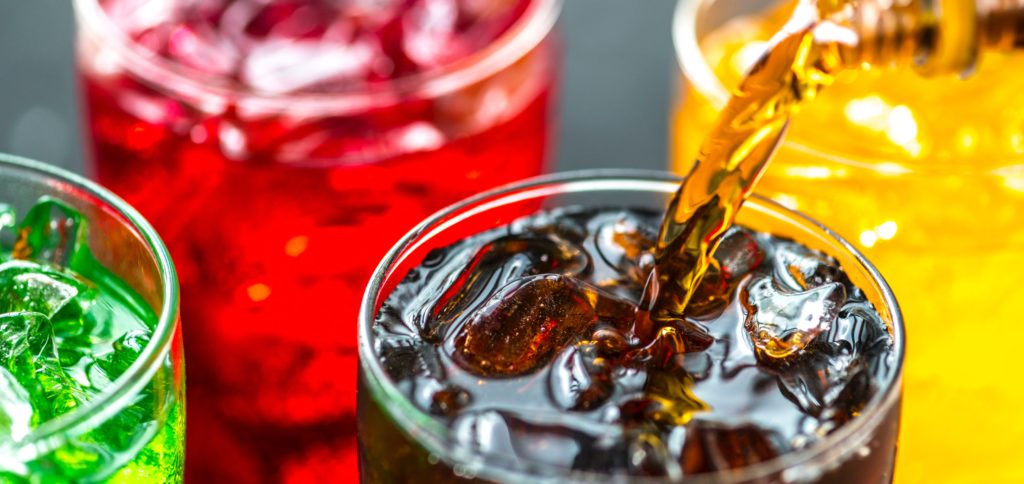Trend: Reduced sugar in soft drinks

“The age of sugar is coming to an end” stated a recent headline in the Süddeutsche Zeitung relating soft drinks without sugar. And the Weiss-Institut, which calls itself “an expert in treating addiction,” now offers treatments for withdrawal from sugar addiction, in addition to cigarettes and alcohol.
Needless to say, the perception of sugar is rapidly changing. An increasing number of studies have identified sugar consumption as a problem, with sweetened beverages, particularly soft drinks, being one of the main culprits. According to the World Health Organization, they are one of the key causes of obesity and type 2 diabetes. In turn, some 6.7 million people in Germany alone now have type 2 diabetes, and approx. every fourth adult is considered obese. Obesity alone results in €63 billion in secondary costs in Germany.
foodwatch: “Every second soft drink is oversweetened”
“There is almost no other European country where people consume as much sugar in soft drinks as in Germany,” warns the consumer organization foodwatch. They back up this statement with figures from the market research institute Euromonitor International, which recently announced that the per capita consumption of sugar in soft drinks on average in 2016 totaled 26 grams per day, or approx. 9.5 kilograms per year. This puts Germany in third place behind the Netherlands and Slovakia as one of the European markets with the highest consumption levels of sugar in soft drinks. As compared with the rest of the world, Euromonitor International puts Germany in 11th place behind markets such as Argentina, Chile, the U.S. and Mexico.
According to a foodwatch market study published at the end of 2018, approx. every second soft drink in Germany is oversweetened. This means that 345 out of the 600 beverages evaluated contained more than 50 grams of sugar per liter. Therefore, the consumer organization is calling for a sugar tax that follows the example set by Great Britain. In April 2018, the British government introduced a levy charge: Companies will have to pay 18 pence (almost 21 cents) per liter for products that contain more than five grams of added sugar per 100 milliliters. And the tax is even higher, 24 pence per liter, for drinks that have more than eight grams of sugar per 100 milliliters. Other countries that impose a tax on highly sweetened soft drinks include Portugal, Estonia, Belgium, Norway, France, Hungary, Mexico, South Africa and some U.S. states.
Beverage industry to independently reduce sugar by 2025
In Germany, the Federal Minister of Nutrition, Julia Klöckner, is now implementing a national reduction and innovation strategy which was adopted by the cabinet at the end of 2018. It is aimed at sugar, fat and salt, with a clear focus on convenience products. The food and beverage industry has pledged to meet specific reduction targets by 2025, and Klöckner announced that the first results will be evaluated by experts in the fall of 2019.
The Association of the German Non-alcoholic Beverage Industry has said it will work to reduce the sugar and calorie content of soft drinks sold in Germany by 15 percent by 2025, as compared to 2015. “We are confident that our category will be able to reach this target with additional reformulation and innovation,” said CEO Dr. Detlef Groß. “The key basis for the success of the strategy is and will remain the public’s acceptance of the products.”
However, their acceptance may signify more than what many of the classic soft drink manufacturers expect. This is because the trend toward a healthy diet that helps people of all ages stay fit is continuing to grow stronger. “We see an upward trend for products with less sugar,” said Petra Ossendorf, AFG expert at Nielsen, “as well as zero products that are now in focus due to the discussion surrounding their impact on health.”
Innovation and strategies that work
In fact, there are already several successful products in the industry. For example, granini had a smash hit with the “Leichte Limo.” Just eight months after its launch, every fifth granini lemonade sold was the version with 50 percent less added sugar. At Sinalco, CEO Heino Hövelmann confirms this positive trend toward its zero varieties: “The sales performance shows that sugar-free products satisfy consumer tastes.”
Even the industry giant Coca-Cola is actively producing and promoting sugar-free and reduced sugar beverages. At the beginning of the year, they started a money-back campaign throughout Germany for consumers who were unhappy with the taste of the sugar-free products. Furthermore, in terms of liter per beverage, Coca-Cola invests approx. 90 percent more in advertising for beverages with reduced and no sugar than for products with normal sugar content. The company is also taking greater strides into the organic market in pursuit of the health trend, with products like Honest organic tea, among many others. For example, in 2019, Coca-Cola Deutschland expanded its brand to include Honest Bio Limonade. This non-sparkling soft drink contains concentrated fruit juice and 30 percent less sugar than comparable products.
Austria is the forerunner
When it comes to soft drinks without sugar, the Austrian market has nosed out ahead of Germany. Once again, the idea is to reduce sugar content in conjunction with beverage producers rather than impose a new tax. According to the preventative medicine institute Sipcan, over the last eight years the average sugar content of beverages in Austria was reduced by 13.5 percent. Nutritional scientist Manuel Schätzer maintains that pressure on the industry remains high thanks to regular analyses. He also opposes a rapid-effect sugar tax because, in his view, consumers require a gradual reduction in sugar to become accustomed to the change. Products such as Pure Tea’s Ingwer Tee, a new and completely unsweetened tea beverage from Pfanner, will work with this familiarization effect.
Soft drinks without sugar – Already a given in Japan
Looking at the beverage market in Japan helps develop an understanding of the future of this health trend. Sugar-free beverages are the focus there starting in childhood. As a result, every vending machine, convenience store and supermarket in Japan has a large selection of cold beverages that are entirely devoid of sugar. Sugar-free tea beverages are particularly popular.
Responding to consumer preferences
Gathering ideas through food retailers has also proven to be useful. For instance, the Cologne-based retailer Rewe has deployed an interesting strategy for reducing sugar: In just one year they lowered the sugar content in 100 of their private label products. Now the recipes are being adjusted for more than 400 items. By 2020, the retail giant wants to reevaluate all of its relevant private brands and offer at least half of them with reduced sugar content. But most importantly, Rewe has involved its customers in this strategy from the very start. For four weeks, customers could select their favorite chocolate pudding among four versions, each with various levels of sugar. The winning pudding contained 30 percent less sugar than the current version – it was added to the selection and remains very popular to this day. This was a clever marketing move that also helped promote the consumers’ acceptance of reduced-sugar products. Perhaps it can serve as a guiding example for the beverage industry to boost customer involvement in the planning and decision-making around reducing sugar.
Rethinking traditional beverage categories?
One question that the industry should ask itself is whether the traditional categories of beverages either help or hinder this shift toward sugar reduction. The trendy maker Lemonaid’s case gives cause for thought. Hamburg’s central district office admonished Lemonaid because one of their drinks didn’t contain the specified minimum sugar content. The authority suggested that they either rename the product or raise the sugar content. Lemonaid declined both options with the remark that the drink had been sold since 2009 without any complaints. In this instance, the Association of the German Non-alcoholic Beverage Industry referred to clearly defined categories and specific rules.
Less sugar can result in natural sweetener solutions
Reducing sugar in soft drinks generally corresponds with the current health trend. However, researchers warn that sugar is often simply being replaced by sweeteners. According to a study conducted by the Canadian Medical Association, consumers who ingested increased amounts of sweeteners had a higher risk of stroke and heart attack and didn’t lose weight. Ingredient manufacturers such as WFSI, Döhler and SVZ International also offer natural sweeteners that are customized for particular beverages throughout the industry. Drink manufacturers will need to consider how they can navigate these sweeteners if they’re going to keep up with the health trend in a sustainable way.
